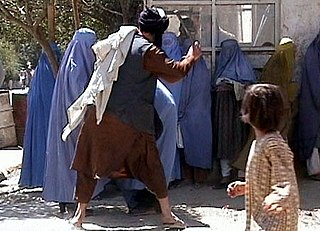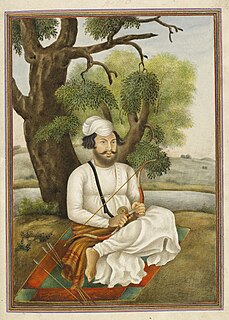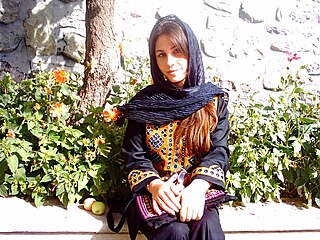Related Research Articles

The Taliban, which refers to itself as the Islamic Emirate of Afghanistan, Taliban Islamic Movement and/or Islamic Movement of Taliban is a Deobandi-Pashtun Islamic fundamentalist, militant Islamist, and jihadist political movement in Afghanistan that is designated by some countries as a terrorist organization. Currently one of two entities claiming to be the legitimate government of Afghanistan, alongside the internationally recognized Islamic Republic of Afghanistan, the Taliban have de facto control of the country. The Taliban's ideology has been described as combining an "innovative" form of Sharia Islamic law which is based on Deobandi fundamentalism and militant Islamism, combined with Pashtun social and cultural norms which are known as Pashtunwali, because most Taliban are Pashtun tribesmen. The group is internally funded by its involvement in the illegal drug trade which it participates in by producing and trafficking in narcotics such as heroin, extortion, and kidnapping for ransom. They also seized control of mining operations in the mid-2010s that were illegal under the previous government.

During its 1996–2001 rule in Afghanistan, the Taliban was considered notorious internationally for its misogyny and violence against women. Its stated motive was to create a "secure environment where the chasteness and dignity of women may once again be sacrosanct", reportedly based on Pashtunwali beliefs about living in purdah. Since the Taliban seized most of Afghanistan in 2021, there are many concerns.

Radio Afghanistan, also known as Radio Kabul or Voice of Sharia, is the public radio station of Afghanistan, owned by Radio Television Afghanistan. The frequencies are 1107 kHz (AM) and 105.2 MHz (FM) for the Kabul area. The name Radio Kabul has been given to many different incarnations of the state-run radio station since the first radio transmitters were installed in Kabul in the 1920s.

Mohammad Ashraf Ghani Ahmadzai is an Afghan politician, academic, and economist who served as the second and last president of the Islamic Republic of Afghanistan between September 2014 and August 2021.

Dr. Massouda Jalal is the first woman in the history of Afghanistan who ran for the Office of the President of Afghanistan in 2002, and again in 2004. She holds the distinction of being the first woman to compete for Presidency in Afghanistan, a highly conservative society where women’s engagement in public life was considered improper, unacceptable, and previously banned. Dr. Jalal emerged as a leading voice of Afghan women in 2001 after her election as the Representative to the 2002 Loya Jirga. While serving her term, she became one of the frontrunners for the position of Interim President, opposite to ex-president Hamid Karzai.

Dr. Habiba Sarābi is a hematologist, politician, and reformer of the post-Taliban reconstruction of Afghanistan. In 2005, she was appointed as Governor of Bamyan Province by President Hamid Karzai, which made her the first Afghan woman to become a governor of any province in the country. She previously served as Afghanistan's Minister of Women's Affairs as well as Minister of Culture and Education. Sarabi has been instrumental in promoting women's rights and representation and environment issues. She belongs to the ethnic Hazara people of Afghanistan. Her last name is sometimes spelled Sarobi.

The Northern Alliance, officially known as the United Islamic National Front for the Salvation of Afghanistan, was a military alliance of groups that operated between late 1996 to 2001 after the Islamic Emirate of Afghanistan (Taliban) took over Kabul. The United Front was originally assembled by key leaders of the Islamic State of Afghanistan, particularly president Burhanuddin Rabbani and former Defense Minister Ahmad Shah Massoud. Initially it included mostly Tajiks but by 2000, leaders of other ethnic groups had joined the Northern Alliance. This included Karim Khalili, Abdul Rashid Dostum, Abdullah Abdullah, Mohammad Mohaqiq, Abdul Qadir, Asif Mohseni, Amrullah Saleh and others.
The following lists events that happened during 2000 in Afghanistan.

Women's rights in Afghanistan have oscillated back and forth depending on the time period. Women officially gained equality under the 1964 constitution. However, these rights were taken away in the 1990s through different temporary rulers such as the Taliban during the ongoing civil war. Especially during Taliban rule, women had very little to no freedom, specifically in terms of civil liberties. Ever since the Taliban regime was removed following the September 11 attacks in the United States, women's rights gradually improved under the Islamic Republic of Afghanistan, and women were once again de jure equal to men under the 2004 constitution, which was heavily based on the 1964 constitution. However, women's rights are still complicated by some groups that wish a return to pre-1964 inequality, which continues to cause international concern. When the Taliban took most of Afghanistan again in 2021, concern about the future for women in the country increased.

This is a timeline of the background of the history of the Taliban. It details the Taliban movement's origin in Pashtun nationalism, and briefly relates its ideological underpinnings with that of broader Afghan society. It also describes Taliban's consolidation of power, listing persecutions by Taliban officials during both its five years in power in Afghanistan and its war with the Northern Alliance. It further covers Taliban's time in power, its fall following the US invasion and its fight against the subsequent occupation, as well as its eventual return to power.
Fatema Akbari is an Afghan entrepreneur and women's advocate who is founder of the Gulistan Sadaqat Company and non-governmental organization the Women Affairs Council. In 2011, she received the 10,000 Women Entrepreneurial Achievement Award.

Fawzia Koofi is an Afghan politician and women's rights activist. Originally from Badakhshan province, Koofi was recently a member of the Afghan delegation negotiating peace with the Taliban in Doha Qatar. She is an ex Member of Parliament in Kabul and was the Vice President of the National Assembly.

The Kheshgi, Khaishgi, Kheshagi, Khweshgi, or Kheshki is a prominent Sarbani Pashtun tribe and Imperial dynasty in South Asia.
Seven is a documentary play, first performed in 2008, written by seven women playwrights based on interviews with seven women around the world who have fought for the rights and well-being of women and girls.

Farida Momand is an Afghan doctor and politician who serves as Minister of Higher Education.

Homeira Qaderi is an Afghan writer, activist and educator. Her name is also written in English as Homeyra.
Khalida Popal is an Afghan football player and director. Popal is the founder and director of Girl Power Organization, the Program and Event Director of the Afghanistan Women's National Football Team, Ambassador to Street Child World Cup, and the Event Manager & Mentor/ Refugee Consultant in COLUMN. She is also the former leader of the Afghanistan women's Football Committee, former Finance Officer of the Afghanistan Football Federation, former captain of the Afghanistan Women's National Football Team, and former football coach of the under-17 and under-15 women's football teams in Afghanistan.
Mirwais Azizi is a Dubai based Afghan businessman. He is the founder and chairman of Azizi Group of companies which he founded in 1989 with a presence in realty, banking, investment, and hospitality. He is the chairman of Azizi Bank the largest commercial bank in Afghanistan, which he established in 2006 with $7.5 million in equity capital and has since reached up to $80 million.
Farahnaz Forotan is an Afghan journalist and women's rights activist. She moved to Iran together with her family during the Mujahideen regime. Farahnaz returned to Afghanistan in 2001, but took refuge in France in 2020 after being included on a Taliban hit list.
Marianne O'Grady is an American teacher and Afghanistan's deputy country director for Care International who said that the Taliban 'cannot un-educate millions of people' in the Fall of Kabul (2021) and anticipated that women would continue to teach other women and girls, even if forced back 'behind the wall'.
References
- 1 2 3 Margraff, Ruth (2009). "Night Wind". Seven (1st ed.). Dramatists Play Service. pp. 92–93. ISBN 978-0822223511.
- 1 2 3 4 5 6 7 8 9 10 Gehrke-White, Donna (2006). The Face Behind the Veil: The Extraordinary Lives of Muslim Women in America. New York: Citadel Press. pp. 176–183. ISBN 9780806527222.
- ↑ Rashid, Haroon (2002). History of the Pathans: The Sarabani Pathans. Haroon Rashid.
- 1 2 3 4 5 6 7 8 9 Boustany, Nora (20 February 2004). "A Beacon, Even in the Darkest Hours". The Washington Post. Retrieved 15 September 2015.
- ↑ "Project for Afghan Women's Leadership: Afghan Women Leaders Speak" (PDF). Mershon Center for International Security Studies. Ohio State University. November 2005. Retrieved 13 September 2015.
- 1 2 "Farida Azizi Speaking on Behalf of Afghan Women". Blassys: Microenterprise eMagazine. Archived from the original on 4 March 2016. Retrieved 15 September 2015.
- ↑ Silberberg, Allison (2009). Visionaries in Our Midst: Ordinary People Who Are Changin Our World. Lanham, Maryland: University Press of America, Inc. pp. 29–30. ISBN 9780761847182.
- ↑ "Women Learn How to Talk to Govt". USAID. United States Government. 25 June 2013. Archived from the original on 4 March 2016. Retrieved 15 September 2015.
- ↑ "The Women & The Playwrights". Seven - A documentary Play. Retrieved 13 September 2015.
- ↑ Seven, 2017, retrieved 14 February 2021
- ↑ Lauren Young (26 January 2017), The Women of "Seven", Msmagazine , retrieved 14 February 2021